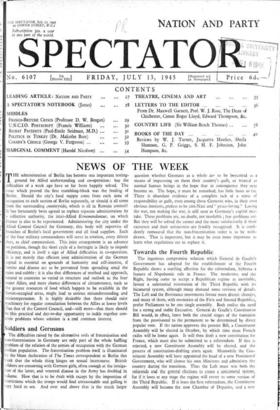Soldiers and Germans
The difficulties raised by the alternative evils of fraternisation and ['ion-fraternisation in Germany are only part of the whole baffling problem of the relation of the armies of occupation with the German civilian population. The fraternisation problem itself is illuminated by the blunt declaration of The Times correspondent at Berlin this v eek that the whole thing hinges on sexual intercourse. British ,alcliers are consorting with German girls, often enough at the instiga- t:on of the latter, and venereal disease in the Army has doubled in \ olume. How that is to be dealt with except by the imposition of
estrictions which the troops would find unreasonable and galling is try hard to see. And over and above that is the much larger
question whether Germans as a whole are to be boycotted as a means of impressing on them their country's guilt, or treated as normal human beings in the hope that in consequence they may become so. The hope, it must be remarked, has little basis so far. There is abundant evidence of a complete lack of a sense of responsibility or guilt, even among those Germans who, in their own obvious interests, profess to be anti-Nazi and " peace-loving." Losing the war, not making the war, is still seen as Germany's capital mis- take. These problems are, no doubt, not insoluble ; few problems are. But they will be solved the sooner and the more satisfactorily if their existence and their seriousness are frankly recognised. It is confi- dently rumoured that the non-fraternisation order is to be with- drawn. That is important, but it may be even more important to learn what regulations are to replace it.


























